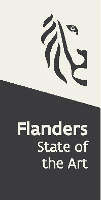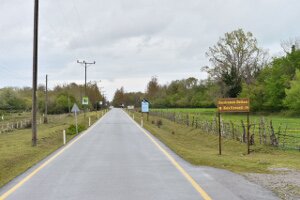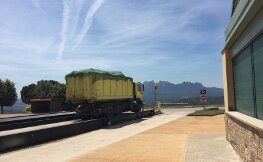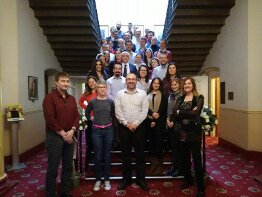
|
| Newsletter n°3 – June 2017 |
| PROJECT UPDATE |
|
FISSAC Project Update Available!
A project update has been released on the FISSAC website, providing a summary of the deliverables recently submitted and approved. These deliverables include:
- D1.7: Strategies for social engagement and acceptance
- D1.8: Initial outline of FISSAC Industrial Symbiosis Model and Methodology
- D2.2: Characteristics of waste streams and requirements for recycling processes
- D2.4: Non-technological barriers analysis and mitigation mechanisms
- D3.1: Life-Cycle Assessment and D3.2: Life-Cycle Costing of new processes, materials and products (Eco
cement, Green Concrete, ceramic tile, rubber wood plastic composite)
- D6.1 FISSAC Software Platform Requirement Analysis Report
- D8.3 First version of the Exploitation Plan
The full project update has been made available here. For futher infomration and regular updates, please check the FISSAC project website and subscribe to our newsletter.
FISSAC Living Labs Sweden
The living labs have begun in Sweden, with four meetings completed and a fifth planned for June 2017.
The living labs have thus far focused on bringing different stakeholders together, commenting on what kind of information is needed for an increase in circular material flow, and the decision to follow a specific material (gypsum/plasterboards) through the steps of the building process to facilitate discussion. More information is available here. You may find the link to follow the living labs taking place in Sweden here. Keep a lookout for a dedicated page on our website, coming soon!
|

First FISSAC Webinar a success!
The first FISSAC webinar focusing on Industrial Symbiosis Tools and Best Practices was successfully held on 23 February 2017!
The webinar included an introduction to the FISSAC tool currently under development. There were also best practice presentations from project partners and a guest presentation by Orée. Social aspects of industrial symbiosis were also touched on through a presentation by a member of the FISSAC social advisory board from University College London.
The presentations have been made available to the public here. Furthermore, a video has been created and can be
accessed through this video registration link. Once you have registered, a viewing link will be sent to your email.
|
|
| Meet some of the partners |
 |
OVAM, the Public Waste Agency of Flanders is responsible for waste management and soil remediation in Flanders. Over the past 25 years, the way in which OVAM has handled waste has fundamentally changed. Where it initially focused on waste management, it has evolved towards resource management and circular economy. This change of policy was initiated out of a sense of urgency as Flanders has limited natural resources and largely depends on import.
To realize the transition towardscircular economy OVAM opted from the start for a far-reaching, cross-sectorial cooperation involving many different stakeholders from industry, knowledge centres, universities, and civil society organisations. To encourage the reuse and recycling of primary raw materials in the production process a regional industrial symbiosis network was created. FISSAC offers OVAM the opportunity to share its experience, exchange knowledge and test its findings in a broader and international context.
|
|
|
EKODENGE is an engineering, architecture, and consultancy SME company with a focus on
research and development activities on sustainable technologies at national and international levels. The company’s main research areas focus on sustainable building design, energy efficiency, material and energy flow with LCA principles and software development for environment and energy related analytics.EKODENGE has expertise in project coordination on international frameworks such as the CIP Eco Innovation, UNDP, WB and EUROPEAID Programmes. Ekodenge’s responsibilities in the FISSAC Project are as follows: Developing the FISSAC industrial symbiosis ICT Platform; Indicator-based assessment methodology for design and monitoring of industrial symbiosis networks; Opportunity identification; and, LCA and LCC for the FISSAC circular economy model. |
|
 |
|
 |
Geonardo is an innovation and technology company active in the energy, environment,
and sustainable development fields. Geonardo provides research, innovation, and consultancy services as well as cutting-edge solutions in the renewable energy, resource efficiency, climate change and natural resources sectors. Across these sectors, Geonardo conducts state-of-the-art life-cycle assessments (LCA), GIS/remote sensing and 3D terrestrial laser scanning (TLS) applications, develops web-based planning and decision support tools, and implements novel training, capacity building, institutional strengthening, and communication and dissemination actions.Within FISSAC Geonardo will primarily contribute to the activities of developing the Industrial Software Platform and Methodology in WP6 as well as the monitoring and validation of the platform through demo and real scale tests. Additionally, Geonardo will also conduct a series of tasks related to replicating the FISSAC model through Living Lab development in Hungary. As a direct result of the project, Geonardo seeks to improve its portfolio with relevant expertise in the field of industrial symbiosis and thus, to reinforce its currently strong regional consultant position. |
|
|
| SPECIAL REPORT: Eco-cement and Green Concrete |

A
photo of Concrete Pavement Example in Turkey
(Black Sea Region) |
|
Nowadays, industrial symbiosis is one of the most important assessed approaches within the context of sustainability in many countries. The cement and concrete sectors play a critical role in implementing industrial symbiosis applications. In an environment where raw material resources are beginning to decrease every day, sustainable economic development cannot be achieved without protecting environmental resources.
To achieve these goals, one of the FISSAC Project’s main objectives is to produce eco-cement and green concrete. When cement and concrete is made from waste gathered from different industries or recycled material, they are called eco-cement and green concrete, respectively. In this sense, the FISSAC model will be a very good example for industrial symbiosis implementation.
|
In the FISSAC Project, the first act is determining the formulation of eco-cement that has the optimum features in various aspects. After that, green concrete will be produced by mixing eco-cement, electric arc furnace slag as aggregate and glass & ceramic wastes as mineral additives. For extending the usage of these eco-friendly products, the validation procedure will be conducted by checking the conformity values.
Demonstrating the repeatability of the model to be created in the FISSAC project, waste will be taken from similar industries situated in different European countries and will be produced with the same formulae and mixture design. This way, transportation and related costs – the most important parameter for companies in the construction sector – will no longer be a problem and this model may also prevent the decrease of the raw materials. At the end of the project, a 50 m long concrete walkway will be constructed as a case study, which will be a good example of a possible end result using industrial symbiosis if we think about the recent increase in the use and application of concrete roads.
Today, sustainability is one of the major concerns of the world. Therefore, every industry should increase their responsibilities regarding to the issues of sustainability. The cement and concrete sector has an important position concerning raw materials and energy consumption. The industries in this sector have to pay great attention not only to cost, profitability, and risk factors, but also to the environmental and social effects created during these production phases. The FISSAC project will act as a test platform through which guidelines can be created in how to operate these industries while paying attention to these factors.
|
|
|
| UPCOMING EVENTS |
|
PAST EVENTS |
|
PARTNER NEWS |
|

|
|
|
|

|
|
FISSAC will be present at the Demolition, Decontamination and Recycling Forum & Expo on 14-18 June 2017 in Brussels. The event is a European trade fair organized by the European Demolition Association (EDA) in partnership with the European Decontamination Institutue (EDI). Participation is free of charge.
Find out more
|
|
The fourth general assembly of the FISSAC project took place in Wortley (United Kingdom) on 29 and 30 March 2017. As previously mentioned, various deliverables were finalised in February and this meeting allowed partners to go over the key findings. The GA also allowed partners to gain a better understanding of the work being done on the FISSAC model for industrial symbiosis under the leadership of Ekodenge.
Find out more
|
|
ACR+ visited the industrial symbiosis project in Manresa with Symbiosy as part of FISSAC project activities. During the visit, the project partners learnt about the success of the project in Manresa, the unique characterists of the location that made it a ideal site for implementation, as well as the challenges still to come during the continuation of the projects as the companies themselves take over the mangement of the initiative.
Find out more
|
|
 |
FISSAC Project Partners |
|
|
 |
|
This project has received funding from the European Union’s H2024 research and innovation programme under Grant Agreement N°642154. |
|

|
|
|
For more information on the FISSAC project, please visit our website fissacproject.eu or contact:
|
| In order to subscribe to subsequent newsletters, please fill in the Get Involved form. |





































